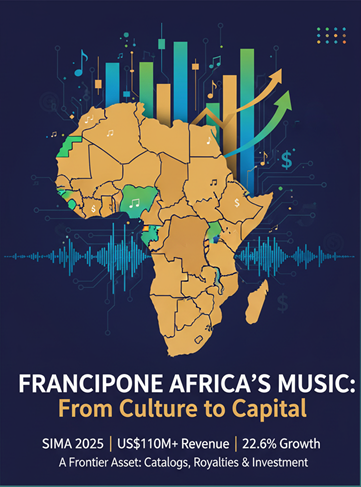Rhythm to Revenue: SIMA 2025 Investment Frontier
Francophone Africa’s music industry is moving from culture to capital. With SIMA 2025 in Benin, revenues above US$110m and 22.6% growth, the sector is emerging as a frontier asset. From catalog buys to royalty-backed debt, music is now an investable opportunity.

Benin’s music industries fair signals Francophone Africa’s push to transform cultural capital into financial markets.
For decades, Africa’s music industry has been discussed primarily in cultural terms, celebrated for its creativity but rarely considered in the language of finance. That may be about to change. When Benin hosts the Francophone Africa Music Industries Fair (SIMA) this November, the conversation will focus less on artistry alone and more on whether Africa’s soundscape can be transformed into an investable frontier asset class. For investors accustomed to chasing growth stories in commodities or sovereign bonds, SIMA signals a new space where rhythm could translate into tangible returns.
The numbers provide the context. According to the IFPI Global Music Report 2025, recorded music revenues in Sub-Saharan Africa topped US$100 million for the first time last year, reaching roughly US$110 million in 2024. Growth of 22.6 per cent outpaces most sectors on the continent and positions music as one of its most dynamic service exports. By comparison, the global industry generated US$29.6 billion in 2024, with streaming alone accounting for over US$20 billion, nearly 70 per cent of the total. Africa’s share remains small at less than two per cent, but the growth trajectory suggests a market that, like frontier debt in the early 2000s, may soon attract mainstream capital once the early risks are absorbed.
The mechanism for turning that growth into finance already exists internationally. In the United States and Europe, funds such as Hipgnosis and Kobalt have securitized catalogues, treating royalties as predictable cash flows. Multiples of 12 to 18 times annual revenues are common in acquisition deals. Yet in Francophone Africa, catalogues are undervalued, largely due to weak collection systems and limited liquidity. That gap is precisely what SIMA 2025 seeks to address: by bringing artists, managers, financiers, and regulators together in one forum, it creates the institutional setting where rights can be valued, packaged, and ultimately priced.
The demand side reinforces the argument. Africa is the world’s youngest continent, with a median age of 19. Telecoms such as MTN, Orange, and Moov Africa are already leveraging music to drive data consumption, while regional streaming platforms like Boomplay, Mdundo, and Audiomack are expanding their presence. International players see the potential: Spotify payouts to Nigerian and South African artists hit nearly US$59 million in 2024, proving that global appetite for African music is no longer speculative. For Francophone artists, the challenge has not been demand but rather visibility, infrastructure, and finance — the very issues that SIMA has been designed to tackle.
Benin’s decision to host the fair is not incidental. Since 2016, the country has positioned tourism and culture as engines of growth, embedding the Meetings, Incentives, Conferences, and Exhibitions (MICE) industry into its development strategy. SIMA fits squarely within this framework, bringing over 7,000 participants for residencies, professional fairs, and a final public concert. Beyond the symbolic value, the structure of the event turns Cotonou into a temporary capital market for creative IP, where ideas, rights, and financing models converge.
Of course, investors must weigh risks carefully. Royalty collection in many Francophone states remains inconsistent, with underfunded and politically constrained management bodies. Currency volatility can quickly erode returns when earnings are denominated in CFA francs or naira while financing is structured in dollars or euros. Enforcement of intellectual property rights under the OAPI system is still uneven, limiting collateral reliability. Liquidity is also a challenge: catalogues cannot yet be traded with the same ease as bonds or equities. These risks, however, echo the early days of African Eurobonds — high barriers at the outset, but double-digit yields for the funds willing to move first.
International precedents offer a roadmap. Nigeria’s Afrobeats has already built a US$1 billion ecosystem, aided by partnerships with Universal, Sony, and Warner. Latin America’s reggaeton leveraged streaming to global dominance, while South Korea’s K-Pop turned coordinated financing and government support into billions of dollars in annual revenues. Francophone Africa has lacked such a coordinated push, but SIMA may represent the institutional turning point — a platform to move from raw potential to proof of concept.
For hedge funds, the opportunity translates into three primary strategies. The first is catalogue acquisition: buying undervalued rights before international licensing inflates valuations. The second is structured finance: royalty-backed debt instruments that generate frontier-style yields from relatively predictable digital cash flows. The third is equity stakes in streaming platforms, fintech's, or event firms that stand to benefit as the ecosystem scales. Each carries risk, but the upside lies in entering before valuations catch up with growth.
SIMA 2025 should therefore be read less as a cultural festival and more as a market signal. It reflects Francophone Africa’s readiness to professionalism its music industry, enforce intellectual property more rigorously, and integrate into global supply chains. For European and American funds seeking high-growth exposure with demographic tailwinds, the region’s music economy offers a rare combination: youth-driven demand, scalable digital platforms, and an asset class that has yet to be fully priced. The challenge, as always, will be execution — whether the infrastructure built around SIMA can translate narrative into revenue. But for investors willing to tolerate frontier risk, the reward is clear. Ignore this market at your peril; in Cotonou this November, music will not just be performed, it will be capitalized.





